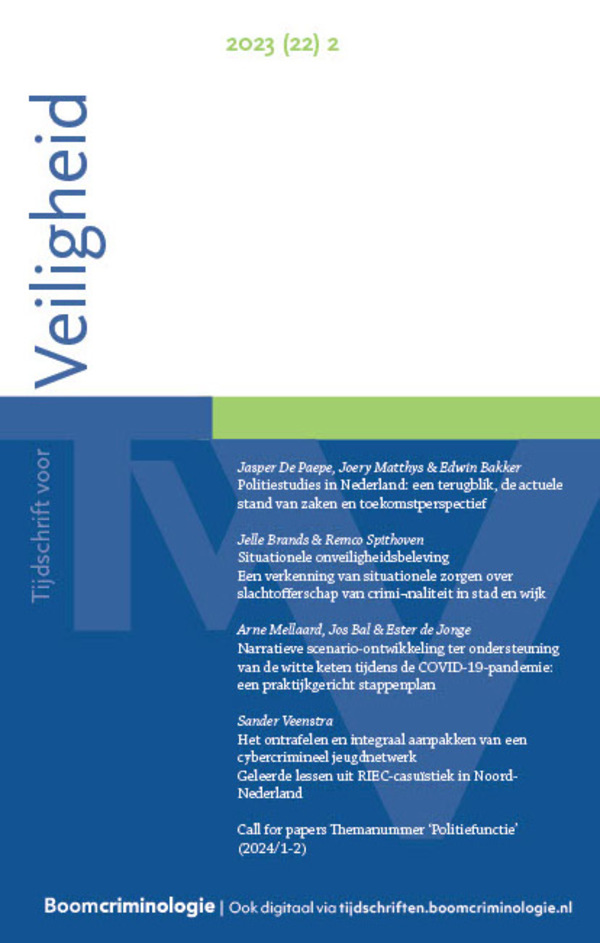|
In an attempt to reduce re-offending rates in the Netherlands, the Dutch government has developed the Prevention of Recidivism program, which started in 2002. The current study aims to describe the content of this program, and aims to give an overview of the state of the art concerning the execution and effectiveness of the program. Results show that the number of detainees taking part in the program is fairly limited. Moreover, in many cases, correctional interventions are not part of the imposed rehabilitation program. An extensive literature study shows that the execution of the Prevention of Recidivism program and various correctional intervention show a number of implementation problems, which probably hamper the program’s effectiveness. However, further research is necessary to assess if the Prevention of Recidivism program successfully lowers recidivism rates amongst program participants. |


Tijdschrift voor Veiligheid
Meer op het gebied van Criminologie en veiligheid
Over dit tijdschriftMeld u zich hier aan voor de attendering op dit tijdschrift zodat u direct een mail ontvangt als er een nieuw digitaal nummer is verschenen en u de artikelen online kunt lezen.
| Artikel |
Rehabilitatie in Nederlandse gevangenissenWat is de stand van zaken ten aanzien van de uitvoering en doelmatigheid van het programma Terugdringen Recidive? |
| Trefwoorden | recidivism, detainees, evidence-based, correctional interventions, evaluation studies. |
| Auteurs | Anouk Bosma, Maarten Kunst en Paul Nieuwbeerta |
| SamenvattingAuteursinformatie |
| Artikel |
Veiliger door de buurtwacht?Over de veiligheidsbeleving van burgerparticipanten en het belang ervan voor lokaal veiligheidsbeleid |
| Trefwoorden | neighbourhood watch, citizen participation, fear of crime, safety perception, local safety policy |
| Auteurs | Gwen van Eijk |
| SamenvattingAuteursinformatie |
|
This article examines the safety perception of citizen participants in neighbourhood watches. Two questions are central: to what extent is it correct to assume that participation increases feelings of safety, and what is the role of measuring safety perceptions in local safety policy? In-depth interviews with 21 participants in The Hague show that participation changes perceptions of safety both positively and negatively, which is related to contacts with other residents, the information they receive about safety and crime problems, and experienced effectiveness in solving problems. Participation seems to result rather in a more nuanced perception of safety. The article ends with a discussion on the value of a detailed insight into the perception of safety for local safety policies. |
| Artikel |
Regionale risicoprofielen ter versterking van veiligheidscapaciteitenOverzicht en evaluatie tegen de achtergrond van het externe-veiligheidsbeleid |
| Trefwoorden | Regional Risk Assessment, all-hazards approach, multi-criteria evaluation, likelihood estimation, risk diagram. |
| Auteurs | Charles Vlek |
| SamenvattingAuteursinformatie |
|
A regional risk profile (RRP) is a systematic ordering – by likelihood and impact seriousness – of identified hazards and threats in one of the Netherlands’ 25 safety regions. Since 2010, RRPs follow the Dutch National Risk Assessment (NRA) as a basis for prioritising regional safety capacities. In Europe, RRPs are proliferating, and the corresponding risk-assessment approach is further spreading internationally. The methodology comprises risk identification, scenario development, multi-criteria impact evaluation, expert likelihood estimation, a two-dimensional risk diagram and an analysis and prioritisation of safety capabilities. A compact overview and discussion is provided of the 25 published RRPs for the Netherlands, each covering between 9 and 40 hazards and threats, along with their most and least worrying risk scenarios. It appears that for many regions pandemic disease, electricity black-out and major flooding are most worrying, while transport accident, industry fire and disturbance of water supply are (relatively) least worrying. Also, in different regions similar risk scenarios (e.g., pandemic disease and electricity black-out) are assessed rather differently, both by likelihood and by impact seriousness. Apparent weaknesses of the RRP (and the NRA) approach so far are, among other: lack of stakeholder involvement, rigid multi-criteria impact evaluation, hybrid methods for likelihood estimation, forced comparison of disparate risk scenarios, and unclear decision rules for risk acceptance. Independent review and validation of major RRP components is recommended for strengthening overall results as a reliable basis for regional safety policies. The ‘new risk thinking’ is considered in view of the long-problematic standard-setting approach about Individual Risk and Group Risk in the framework of Dutch external-safety policies. The RRP approach may be called ambitious and much-demanding. External validation and closer cooperation between safety policy-makers and scientists seem desirable. |
| Boekbespreking |
Orde in veiligheid |
| Auteurs | Marc Cools |
| Auteursinformatie |
